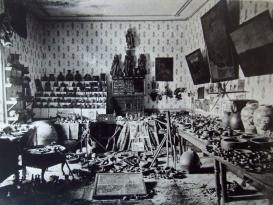Stefanie Gänger'S PhD project examined the collecting and study of pre-Hispanic artefacts in nineteenth-century Chile and Peru. Though the role of foreign travellers and scholars dedicated to the study of South American pre-conquest history is well-documented, nineteenth-century Creole antiquarianism and archaeology is hardly understood. This absence of any studies of Creole erudition indicates the Eurocentric construction of Peruvian and Chilean histories of the discipline, and skews our reading of nineteenth-century archeology.
The project thus had two overarching aims. First was to uncover the agents involved, and to reassemble their discourses and the private and nascent public collections they formed. Second was to place the collectors and students in historical context: in the construction of postcolonial identities and territories, globally circulating scientific discourses and ideas, as well as local political and social history. To reconstruct the Peruvian and Chilean agency in archeology and antiquarianis, this thesis operated with a broad definition of scholarship, one not confined to the knowledge produced within the boundaries of academic discourses or the visibility given by institutionalisation, which Peruvians and Chileans, often lacked. In this context, the project benefited from the turn to practice theory that marked a profound change in the history of science: situating the production of knowledge in everyday and public life, in its social and material dimension, the project moved beyond heroic narratives and celebrated expeditions, to render visible how knowledge was made on quotidian commercial voyages, during military inroads or engineering works and within private parlors and collections.
This approach allowed the inclusion of those who studied the past unrelated to state-based institutions, of private collectors, as well as of "indigenous intellectuals" that contributed to and interfered with the scholarly discourse. Stefanie Gänger therefore focused on primary sources that often lacked authority or salience, including documents such as private correspondence, expedition reports, private collection catalogues, newspaper articles, and unpublished manuscripts.

